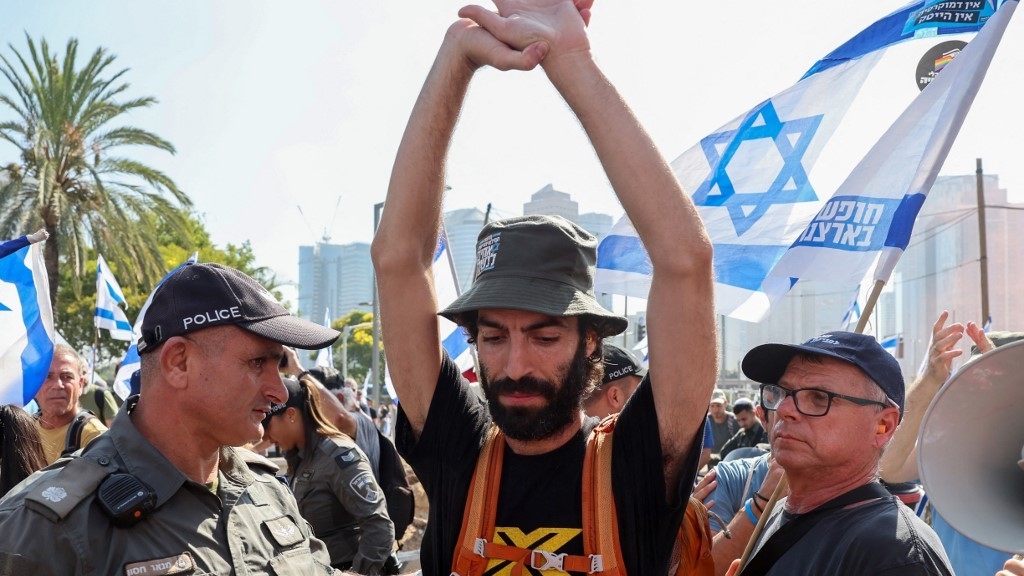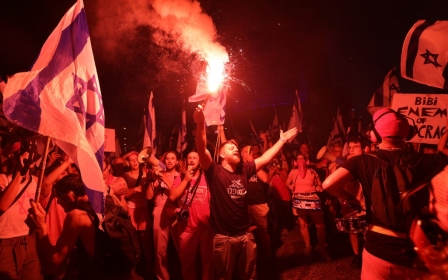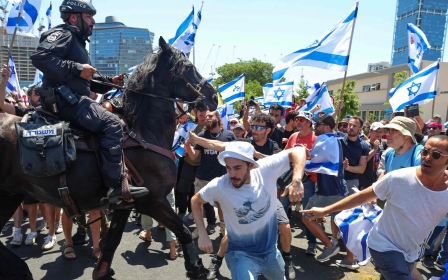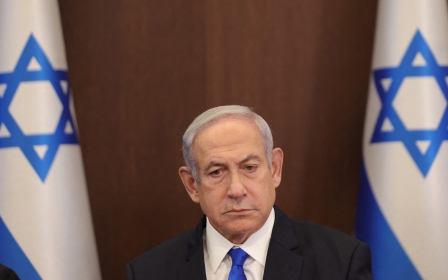Israeli judicial crisis: Protesters gather for 'day of disruption' ahead of key bill vote

Israeli demonstrators took to the streets again on Tuesday and blocked several key roads across the country as legislators prepared to ratify one of the government's disputed judicial overhaul bills.
The protests, which have been held nationwide, are against a parliamentary vote on a bill that would not allow the courts to overturn government decisions which they deem unreasonable.
On Tuesday afternoon, at least 29 people were arrested at the Tel Aviv-Hashalom train station in central Tel Aviv.
Israeli police have blocked hundreds of protestors from accessing the train platform, saying they couldn't allow people with flags boarding the train.
In the port city of Haifa, Israeli police shut down the train station after protestors burst onto the platform, carrying Israeli flags. The police have also barred protestors from entering the Herzliya and Lod train stations.
Since January, Israeli protestors have relied on trains to commute to the rally sites, as major roads, such as Ayalon Road, have been blocked by protestors.
As part of the "day of disruption", demonstrators have blocked roads and mobbed the stock exchange. Some also gathered outside and blocked the army headquarters in the run-up to the parliamentary vote, which they say will "dismantle democracy".
Early on Tuesday, Israeli police said that a number of protesters were arrested in different locations, while many others gathering in the streets were handcuffed.
According to Israeli media reports, around 37 people have been arrested across the country so far.
The police have tried to clear major roads of vehicles, as protesters threw stones, fences and cans onto the roads.
Large numbers of demonstrators were also seen outside US embassy in Tel Aviv, ahead of the Israeli President Isaac Herzog's upcoming meeting with U.S. President Joe Biden later this evening.
Thousands of people have been joining the protests since the start of the year, which have at times descended into violence.
The government's proposals have divided the nation and triggered one of the biggest protest movements in Israel's history since being unveiled in January by the hard-right government of Prime Minister Benjamin Netanyahu.
Weekly rallies across Israel have drawn tens of thousands of protesters aiming to prevent what they believe could open the way to a more authoritarian government.
Netanyahu's government proposed a series of drastic changes to the country's judiciary shortly after taking office in December.
The proposed laws would give lawmakers greater control over the appointment of judges as well as give parliament the ability to overturn high court decisions.
Further protests are planned to take place across different locations today and throughout the week.
Middle East Eye propose une couverture et une analyse indépendantes et incomparables du Moyen-Orient, de l’Afrique du Nord et d’autres régions du monde. Pour en savoir plus sur la reprise de ce contenu et les frais qui s’appliquent, veuillez remplir ce formulaire [en anglais]. Pour en savoir plus sur MEE, cliquez ici [en anglais].




